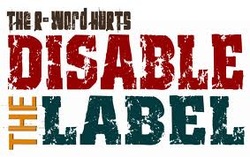 By Samantha Pierce In sociology there is a theory, called the Sapir-Whorf thesis (also known as linguistic relativity) , which claims “people see and understand the world through the cultural lens of language.” (Macionis, 2011)* To put it another way, language creates reality. Since Edward Sapir and Benjamin Whorf first put forth their theories on the relationship between language and reality in the first half of the last century sociologists have come to the conclusion that language doesn’t determine reality in any strict sense. For my part I think our language reflects our reality rather than genuinely creates it. But we still act as if we believe that language creates reality. Consider the terms used to describe people with developmental disabilities. First we had imbeciles, morons, idiots. All originated as clinical terms to describe the developmentally disabled. We now know them as throw away insults used by young and old alike. In the span of a few decades we have seen the term “retarded”, once a clinical descriptor for those with developmental delays, degenerate into an insult so grave that there is a movement to stamp out the use of the word. It’s called the euphemism treadmill where new terms are developed to replace old terms that have come to be seen as derogatory. Even the term “special needs” seems to be taking its turn on the euphemism treadmill for some. All of this brings to me to the person, or people, first language movement. “People-first language is a form of linguistic prescriptivism in English, aiming to avoid perceived and subconscious dehumanization when discussing people with disabilities, as such forming an aspect of disability etiquette.” The idea is basically to name the person first and the descriptor of their condition second. In English we usually do things the other way round. Such tinkering with English sentence structure is seen by some as a good thing for the disabled. It is an effort to create a reality where the personhood of the disabled is valued and respected. In essence it is an attempt to apply the Sapir-Whorf thesis in its language creates reality form. Advocates of person first language claim that we should embrace person first language “To ensure inclusion, freedom, and respect for all.” I agree with some of the sentiments expressed in the above linked article, such as, “The real problem is never a person’s disability, but the attitudes of others! A change in our attitudes leads to changes in our actions. Attitudes drive actions.” But I am more than a bit skeptical that acts of linguistic gymnastics will make any forward movement towards better treatment of and greater respect for the disabled. Unless we work to change attitudes about the disabled within our culture and within our society it’s not going to matter what clumsy, politically correct term is dreamed up next to gloss over the fact that the disabled are greatly devalued in our culture. Person, or people, first language hinges on the idea that a person is a person first and their disability is secondary to their personhood. Now the problem with this kind of thinking is why anyone would think that identifying someone with their disability somehow denies their personhood. Another problem with person first language is that despite the fact that many of the disabled themselves reject the use of person first language and the reasoning behind it other, often nondisabled people, keep pushing for its use. In researching this article I found very few references among supporters of person first language to the opinions of the disabled about person first language (the two references were from Wikipedia and About.com.
3 Comments
|
Categories
All
Archives
December 2021
|
Photo from Hayzphotos
 RSS Feed
RSS Feed
